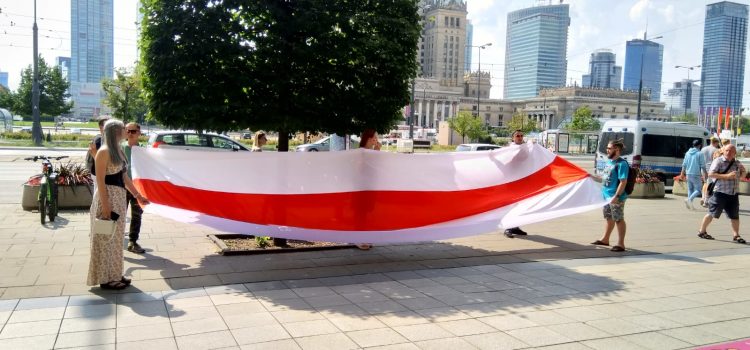Ivan Savanowicz
Freelance journalists
e-mail: press@democracyangels.com
Ruslan Khazin. Threat to the constitutional order of Russia. This is an interview with Ruslan Khazin, one of the leaders of the Belarusian diaspora in St. Petersburg. Then we learned that he was already in Minsk, in the KGB pre-trial detention center.
This is an interview with Ruslan Khazin, one of the leaders of the Belarusian diaspora in St. Petersburg. A man whom the FSB of Russia recognized as a threat to the constitutional order of the Russian Federation. Ruslan spoke about the persecution in Russia and about his acquaintance – Alexander Feduta, a former associate of Lukashenko, now accused of organizing a coup d’etat.
Ivan: Tell us about yourself
R: I was born in Belarus in 1970 in the city of Grodno. I went to school there. He studied in a math class and seemed to be successful. I was lucky, in high school my class teacher was Vladimir Milinkevich – the brother of Alexander Milinkevich, who at one time ran for the post of head of state. I also managed to get to know him later.
Ivan: How did you meet Alexander Iosifovich?
R: I took part in Olympiads in physics and mathematics. Thanks to this, I ended up in a children’s camp for gifted children, participants in the Olympiads. And the leader of this camp was just Feduta Alexander Iosifovich. It was about 85 years old. There we met. I was not the most obedient child. There was even a small conflict with him, which, nevertheless, then grew not so much into friendship, but into a very good acquaintance.
Ivan: Did you get involved with politics under his influence?
Ruslan: Honestly, no. After that, we did not communicate much, I went to study in St. Petersburg. Probably I learned about his political activities already during the 1994 elections.
Ivan: And before that, were you somehow involved in it?
Ruslan: I studied at the institute in St. Petersburg. Probably, it was then that my first acquaintance with political processes took place. You understand, first perestroika, glasnost, then the collapse of the Soviet Union. Of course, we, as students, could not be involved in this. We participated in everything that happened in those years. I cannot say that we then adhered to some political trend or party. But it was all new and interesting for us. We went to rallies. At the Kazan Cathedral there was a place where concerned citizens constantly gathered, with appeals and speeches.
Ivan: But you eventually moved back to Belarus. Why?
Ruslan: Considering the situation that developed in those years, in 1993 I decided to return to Belarus. The Union collapsed, and with it almost all economic ties were severed. There was a complete lack of money. In Russia everything was really bad, there were factories, there was no work. Against this background, Belarus looked much more promising.
Ivan: Sorry to interrupt. So it was in 1993? There hasn’t been any Lukashenka yet, but have enterprises in Belarus already worked better than in Russia? That is, it is a myth, invented by Lukashenka himself, that it was he who saved the economy and enterprises?
Ruslan: Yes, in fact, that’s why I decided to return to Grodno in 1993. I was offered to work at Grodno-Azot in an engineering position. It was a difficult time in terms of some kind of device, you know. I mean everyday life, the organization of my life. If before I acted more in the role of an observer in political processes, then at that moment I had to completely move away from politics for a while.
Ivan: How did you find out about Feduta’s political activities?
Ruslan: in 1994, under rather populist slogans about the fight against corruption, such a deputy Lukashenka appeared. I remember there was such a newspaper “7 days”, there I once came across his article about how he was engaged in anti-corruption activities on a deputy’s instructions. He made a speech at a meeting of deputies and there was an article about it. After that, his name sounded more often. Then there were proposals to transform Belarus into a presidential republic, and in this regard, Deputy Lukashenko went to run for presidential candidates. And then I learn that my old friend, Alexander Iosifovich Feduta, became the head of his campaign headquarters. Prior to that, Feduta was one of the teachers at the Grodno University. In the early 90s, he moved to Minsk and was there, as far as I remember, the first secretary of the already dying youth union. From there he went to Lukashenka’s team. A little later, we talked with Feduta. He said that it was at that time that he introduced Valery Tsepkalo (the candidate for the presidency of Belarus in the 2020 elections) to Lukashenka and also attracted him to the campaign headquarters. And Lukashenka won in these elections.
Ivan: But he was not in Lukashenka’s team for a long time?
Ruslan: Yes. Less than six months after the elections, in 1995 Feduta loudly announced on TV that he was leaving Lukashenka’s team due to disagreements, mainly on domestic policy issues.
Ivan: Didn’t there really be disagreements before? What attracted him to Lukashenka before the elections?
Ruslan: It’s hard to say what exactly attracted him to Lukashenka. At that time, Lukashenka was such a simple guy, a native of the Shklov hinterland. Immediately undertook to exploit this populist theme of the fight against corruption. He promised that he would not let the factories and collective farms collapse. I have already noted that in those days there was a break in economic ties.






